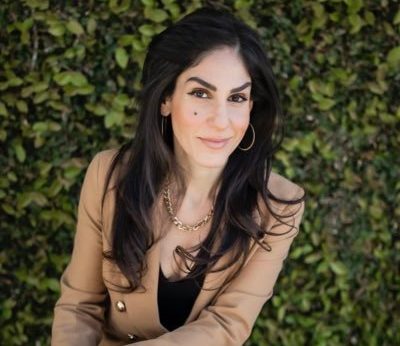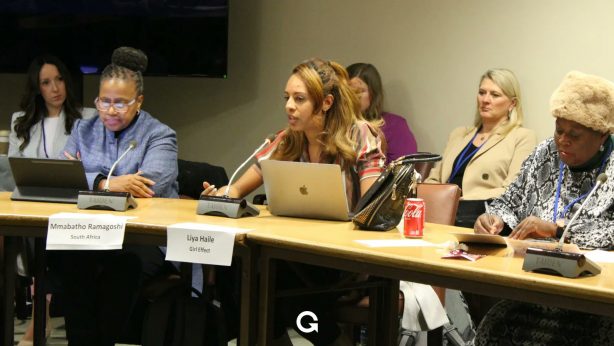Women in Dev Steering Committee Spotlight – Natalia-Nana Lesterbush
Please start by telling us a little bit about yourself and what you do?
Okay. Well, I’m Natalia-Nana. My pronouns are they/she. I’m a female, cis, pansexual, gorgeously caramel-skinned, disabled member of the Women in Dev Steering Committee!
I have been linked with WID since its foundation—I think I’m an OG… I think I’m an actual bonafide OG.
I’ve worked in education, social care, and in the charity sector. By trade and specialism, I’m a consultant on equity, diversity, inclusion, and liberation. That involves me having a part-time position with a really white, really traditional (as most British charities are) organisation. I advise and lead their work in the region on equality, equity, and diversity.
“I’m so privileged and joyful to be able to work in something that is my raison d’être.”
And in my personal freelance work, I consult with charities, community groups, and faith groups on more general D&I and with much more focus on anti-racism, decolonisation, and liberation.
D&I work is so fucking hard, personally costly, and painful. But it gives me so much joy. I’m so privileged and joyful to be able to work in something that is my raison d’être. It is who I am. It is what I do. I’m all about self-actualising, transformation, and internal and external liberation— both within ourselves and within our relationships.
Can you talk to us a little bit about how that work feeds into WID and your position as a Steering Committee member?
When I first met Rachel Firth, the Founder of WID, I was hosting a panel on which she was speaking. She then reached out to me months later asking if I would host a panel for the upcoming Women in Dev conference. Then, that sort of snowballed into me hosting the entire conference, consulting on forming the conference in a more inclusive way, and also hosting and speaking on some of the panels myself!
I think my involvement with WID partly grew from me really bringing in my inclusion experience and perspective. Credit to Rachel for being open and receptive to it. I was proactive, but also quite challenging in holding her to account in formulating this. And part of that was because I really bought into her vision of making this a conference that was more decolonised; A conference to turn conferences on their head.
“Rachel and the other organisers made sure that they invited those with expertise that was lived, organic, and community-based. Because that’s expertise.”
Conferences are so often white-capitalist-patriarchal in their very formation; They centre white male power; They centre expertise and knowledge, which has been codified and categorised in a really specific way of— you are the expert because you have this qualification—or—you have published this book, which is published by a well-known and respected white, Northern-Hemisphere publication house…
Rachel and the other organisers made sure that they invited those with expertise that was lived, organic, and community-based. Because that’s expertise, not writing a long dissertation about it and getting the privilege of being called doctor… Rather, actually inviting those who live and breathe this work in communities at the very front line.
In summary, it was very organic. It came from a place of me offering out of authenticity and integrity, my insights, time, and my passion. I didn’t really know what I was signing up for!
You’re coming towards the end of your tenure as a Steering Committee member. How have you seen the network grow and where would you like to see it go?
The tenure of my role in the Steering Committee has been during COVID, so it’s been a really interesting time to be involved. It’s an international Steering Committee. And when I say international, I don’t just mean a bunch of Northern-Hemisphere, white people. It genuinely is international. And because of that, more dynamic, more agile way of organising ourselves.
During COVID, I’ve seen WID grow behind the scenes. And that is really beautiful to see. We’ve seen women of colour, and particularly young women of colour, entering that very white, very homogenous, middle-class, Northern-powered, patriarchal sector and then saying what they need and what they wanna see.
Our strategy was developed directly as an outcome of the requests shared at the conference by young women of colour in the sector. And I loved that. That’s quite a unique way, quite a rare way, of working; In response to the people that we’re here to work with and be here for.
For example, conference participants said they want to have more resources that are particularly tailored about centering the voices of women like them. So that led us to host panels on Zoom and recording them so that there’s free, open-source access. I wanna make sure that people of colour’s work is being valued and protected and not just being shared around for free, which then may cost that person opportunities for remunerated work, but also balancing that with trying to de-capitalise knowledge: share it and actually trust in abundance and trust in the collective ownership of work.
So I love that the recordings that I and others were part of in 2020 of doing a collected series of convening people with different years of expertise, different viewpoints, and different areas of experience on the issue. The panel in which I participated in is still available for free on YouTube now, two years later. So we’re actually responding to the express need of young women of colour entering this challenging, dynamic sector.
Do you have any words of advice for a young woman, particularly a young woman of colour, who is interested in participating in the sector and wants to do it in a way that’s authentic and genuine without becoming colonised by the space?
What an excellent and rich question! I’d say the important thing is to recognise that you’re already colonised. It’s impossible to live in a world that has been defined by Northern colonialist expansionism, which has reached every single country with the exception of a few very, very remote tribes. It has infected and influenced and formed every country’s way of being, culture, economic systems, political systems, judicial systems, educational systems.
It’s impossible for us not to be colonised. And now that’s perpetuated by trade and debts as well as media influence and leadership influence around the world. I think the first thing is identifying that within ourselves and embracing our own liberation journeys.
I went through a bit of a crisis when I entered the “white hedge” that is the international reparations (you know, international development) sector, in recognising that I want to learn and be informed and be supported and molded and guided by women of colour.
“I was really struggling with centering myself in such a white patriarchal world…”
I thought— I need some elders. I need some aunties around me, but I don’t have access to them. And I don’t know how to get access to them. So this is certainly something you can do: Put yourself out there. Reach out to some influencers and elders in the sector and in different sectors. Reach out and connect on LinkedIn, send a personal message.
Also, you can learn from others in the international reparations sector doing work that you admire. Reach out to them and see if you can just put in a 20-minute chat. I didn’t do that, but I may well do it now… What’s the worst that can happen? They blank you or they say, no. Alright, you’re in the same position you were in beforehand. And so, definitely putting yourself out there.
But also, what came to me when I was having that crisis—and it was a crisis— I was really struggling with centering myself in such a white patriarchal world, which then raised a lot of identity issues within me, and feeling very unmoored, anchored, unguided… I came to the realisation that you can find mentoring through YouTube.
I also believe in collaborative mentoring. When I was in my first charity role, my mentor was fantastic. This woman I dismissed in my mind as a basic nice, soft, gentle white woman, the blonde ponytail and everything. Eats salads for lunch. I was like, oh no. Oh no, no, no. Oh no. But she’s brilliant. She’s now my best friend.
“Put yourself out there. Reach out to some influencers and elders in the sector, and in different sectors.”
So I decided I can sit at the feet of elders who are forerunners in this area, like Dr. Christina Cleveland: a true liberation expert. These are not people who are in the charity sector. They’re not in the INGO sector. They are women of colour who are modelling, a way of influencing, a way of sharing their story, and a way of living an authentic path of liberation and commodifying that; earning money from that. From operating in a liberated space and showing the journey, not the destination, not the final product, but sharing the journey, which to me is essential for decolonisation.
Finally, I want my work to be aligned with who I am. There are times to just take a job, because you’re like—okay, this is an opportunity, or I just need to get it on my CV. But there are things for me that leave my spirit with an unpleasant taste. The tone that that work or that experience is giving me is off-key. And I can’t know that if I don’t know the hum of my own heart, of my own song.
So, know yourself and your decolonisation journey commitments. The answers are within as much as they are without!



Good points Darling- really, ND. – you have blossomed! Keep at this.
Anon. Dad / Lara.